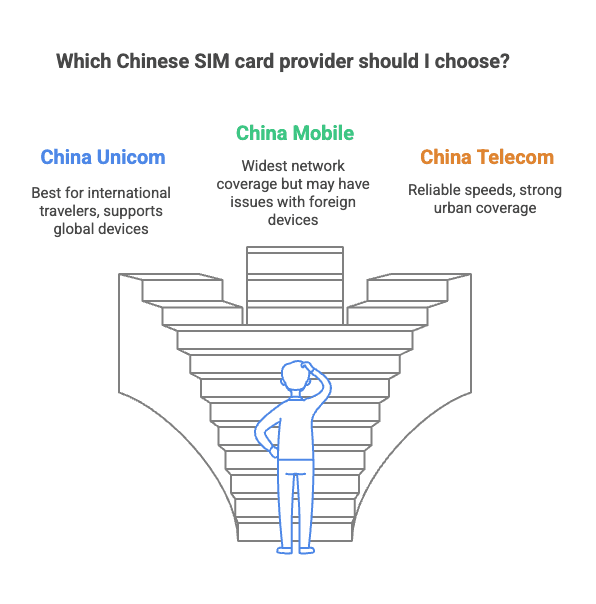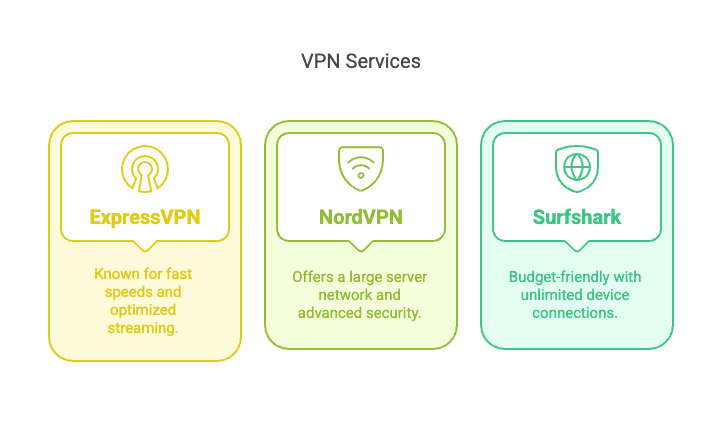How To Buy A SIM Card For China
Stay connected on your next trip to China
Summary
If you're traveling to China, staying connected is more than just a convenience — it’s a necessity for navigation, communication, and accessing essential online services. However, internet access in China comes with unique challenges, and travelers often find themselves unable to use popular websites and apps due to strict government censorship, known as the Great Firewall.
To bypass these restrictions, you’ll need to buy a VPN-integrated SIM or an alternative solution like an international eSIM to stay connected without limitations.
In this guide, we’ll explore the best SIM card options for China and help you choose the right one for a seamless online experience.
Challenges of Accessing the Internet in China
When traveling to China, one of the biggest obstacles is internet censorship, which restricts access to many global websites and apps. This can make communication, navigation, and even basic browsing difficult for travelers.
Blocked Websites & Apps in China
Due to the Great Firewall, many popular services are inaccessible without a workaround. Blocked platforms include:
- Google Services (Gmail, Google Maps, Google Drive, YouTube)
- Social Media & Messaging (TikTok, Facebook, Instagram, WhatsApp, Messenger, Twitter, Reddit)
- News Websites (BBC, The New York Times, and other international media outlets)
The Role of the Great Firewall
The Great Firewall is China's advanced censorship system that filters and blocks foreign websites. This affects not only traditional local SIM cards from China Unicom, China Mobile, and China Telecom, but also international roaming services, which may still be subject to restrictions.
VPNs: The Only Workaround
A VPN (Virtual Private Network) is essential for unrestricted browsing in China, as it allows you to bypass censorship by encrypting your internet traffic and routing it through a different country. However:
- Not all VPNs work in China, as some get blocked.
- Free or unreliable VPNs can result in slow speeds or disconnections.
Staying Connected in China
While internet restrictions in China can be challenging, there are several ways to stay connected without interruptions. Below, we’ll explore the best alternatives — from local SIM cards with VPNs to international roaming and VPN-integrated eSIMs — so you can choose the option that best fits your needs.
Option 1: Get a Roaming SIM that works in China
One of the easiest and most reliable ways to stay connected in China is by using a roaming-enabled SIM. Unlike local SIM cards that may have limited access due to internet restrictions, roaming SIMs connect to international networks, allowing more open access to essential apps and websites.
These SIMs automatically route your connection through overseas servers, bypassing China's internet restrictions without the need for a separate VPN. This means you can access Google, WhatsApp, Instagram, YouTube, and other commonly blocked services as soon as you insert the SIM — no additional apps or configuration needed.
Key benefits of using a roaming SIM
- No setup required – Just insert and connect; no need to install or configure extra tools.
- Stable and secure connection – Access global apps and sites without switching VPNs or servers.
- Bypasses the Great Firewall – Allows access to blocked platforms from the moment you connect.
- Ideal for travelers – Avoids the hassle of buying a local SIM and finding a workaround for internet restrictions.
Wondering how to buy an eSIM before heading to China? It’s simple — Nomad’s China eSIM offers a hassle-free roaming solution. With plans starting from $1.70/GB, you can access blocked sites, use essential apps, and avoid high international roaming fees — all without extra setup. With instant activation, secure browsing, and unrestricted internet access, Nomad’s roaming eSIM gives you complete online freedom in China — all in one convenient package.
Option 2: International data roaming
For travelers looking for simplicity and convenience, international data roaming allows you to stay connected in China without needing a local SIM or VPN. Since roaming relies on your home network provider (e.g., AT&T, Verizon, Singtel), you won’t be subject to China’s firewall restrictions — giving you access to TikTok, Google, WhatsApp, and other blocked services.
While roaming is hassle-free, it comes at a cost:
- Expensive rates – International roaming can be significantly more costly than other options. Always check your provider’s roaming charges before enabling it.
- Possible throttling – Some carriers may slow down your connection after a certain data usage limit, affecting your browsing speed.
- VPN limitations – VPN compatibility depends on your home carrier’s policies, which may restrict access to certain services.
If you choose this option, be sure to review your carrier’s roaming plan to avoid excessive charges. Check out our previous blog post for tips on minimizing roaming fees.
Option 3: Local SIM card with VPN
Getting a local Chinese SIM card is another alternative to stay connected while traveling in China. It allows you to access mobile data at local rates, make calls, and use certain local services. However, a local SIM alone won’t bypass internet restrictions, meaning you’ll still need to use a VPN to access blocked sites.
Where to buy a local SIM card in China
No matter where you travel in China — whether it's Shanghai, Beijing, or beyond — you can buy a local SIM card from the following locations:
- Airport kiosks – Convenient but often more expensive than city stores.
- Mobile carrier stores – Available at China Unicom, China Mobile, and China Telecom shops (passport required).
- Convenience stores & supermarkets – Some outlets sell prepaid SIM cards, though selection may be limited.
Due to China’s strict telecommunications regulations, you’ll need to provide your passport for identity verification when purchasing a local SIM.
Comparing local Chinese SIM Cards

Here’s a breakdown of the top three providers:
- China Unicom – Best suited for international travelers as it supports most global devices. VPN usage may work on some networks, and it offers competitive pricing with flexible data plans.
- China Mobile – Has the widest network coverage in China but may face compatibility issues with foreign devices. Blocks many VPNs, so accessing restricted sites could still be a challenge. Offers large data bundles for extended use.
- China Telecom – Provides reliable speeds and strong urban coverage. VPN success is mixed, meaning some VPNs may work while others are blocked. Known for being affordable with generous data allowances.
Since Chinese SIM cards do not bypass the Great Firewall, a VPN is necessary to access restricted sites like Google, WhatsApp, Instagram, and YouTube. When connected to a VPN, your traffic is encrypted and routed through a different location, allowing you to browse without restrictions.
Comparing VPN Services for China
Here’s how some of the top VPN providers compare:

- ExpressVPN – Known for its fast speeds and optimized streaming performance, ExpressVPN remains a popular choice for travelers in China. However, it is frequently targeted by Chinese censors, so connection success may vary. Offers strong encryption and an easy-to-use interface.
- NordVPN – Features a large global server network and advanced security tools. It is a reliable alternative for bypassing China’s restrictions, with multiple server options for better connection stability.
- Surfshark – A budget-friendly VPN that allows unlimited device connections. Works well in China, but manual setup may be required for optimal performance. It has an intuitive interface and strong security features.
How to Buy a Local SIM Card in China
If you're planning to buy a local SIM card in China, it's important to know where and how to get one. Due to China's strict telecommunications regulations, all SIM purchases require real-name registration with your passport. Here’s a breakdown of your options:
1. At the airport: Buy a SIM card upon arrival
If you prefer to get a SIM upon arrival, you’ll find carrier kiosks at most major Chinese airports. Here’s what to keep in mind:
- Locate the official carrier kiosks – China Unicom, China Mobile, and China Telecom have booths at major airports.
- Expect higher prices – Airport SIM cards are often more expensive than those purchased in the city.
- Passport required – You must present your passport for real-name registration.
This option is best for travelers who didn’t pre-order a SIM and need connectivity immediately.
2. At a Mobile Carrier Store: Buy from Official Shops
For better rates and data plans, you can visit an official store of China’s major telecom providers:
- China Unicom, China Mobile, or China Telecom shops are located in cities across China.
- Expect long wait times, especially in busy locations.
- Bring your passport for identity verification.
This option is best for those staying in China long-term and looking for a cost-effective option.
Setting Up Your SIM Card & VPN in China
Once you’ve purchased a SIM card or eSIM, you’ll need to set it up properly to ensure a smooth connection. Here’s how to get started:
1. Activating a local SIM Card
- Insert the SIM card into your phone and restart the device.
- Ensure your phone is unlocked, as locked devices may not support foreign SIM cards.
- Enable mobile data and check if it connects automatically.
- If required, manually configure APN (Access Point Name) settings, which can be found on the carrier’s website or customer service.
2. Configuring an eSIM
- Scan the QR code provided by your eSIM provider.
- Download the eSIM profile and install it on your device.
- Activate the eSIM through your device settings.
For a hassle-free setup, Nomad eSIM users can install their eSIM automatically through the app:
- Open the Nomad iOS or Android app.
- Go to Manage eSIM.
- Select the eSIM you want to install.
- Tap "Installation Instructions" → "Add Automatically."
- Choose "Install eSIM Now" and follow the on-screen instructions.
3. Using a separate VPN with a local SIM
If your local SIM doesn’t include a built-in VPN, you’ll need to install one manually:
- Select a server outside China to bypass restrictions.
- Configure encryption protocols (OpenVPN or WireGuard recommended).
- Enable obfuscation mode, if available, to avoid detection.
Activating a roaming-enabled eSIM (Nomad’s Solution)
With Nomad’s roaming eSIM, setup is instant and automatic:
- No extra configuration needed — your connection is encrypted upon activation.
- Optimized network routes ensure fast and stable connectivity.
How to Top Up & Recharge Your SIM in China
Once your SIM is activated, you may need to top up or check your balance to avoid running out of data.
Methods for recharging your SIM
- WeChat Pay & Alipay – The most convenient method, though you may need a local bank-linked account.
- Carrier websites – Log in to China Unicom, China Mobile, or China Telecom’s site and follow the recharge instructions.
- Convenience stores – Many stores sell prepaid top-up vouchers that can be used to add credit.
How to check your remaining balance and data
- Dial the carrier’s customer service number (found on their website).
- Use the carrier’s mobile app (if available in English).
- Send an SMS with a balance inquiry code (varies by provider).
What to do if you run out of data
- Purchase a top-up package through your carrier’s website or app.
- If unable to top up, consider switching to a new data plan or SIM.
Frequently Asked Questions
Can I use my home country’s SIM card in China?
Yes, but it depends on your mobile carrier’s international roaming policies. Most international SIM cards allow data roaming in China, meaning you’ll experience the same access as you would in your home country, without additional internet restrictions imposed by the Chinese government. However, roaming charges can be extremely high, making it a costly option for extended use.
For a more affordable and unrestricted internet experience, consider a VPN-integrated eSIM or a local SIM with a separate VPN to bypass China’s Great Firewall and avoid expensive roaming fees.
Which Chinese carrier has the best coverage?
China Mobile offers the widest network coverage, especially in rural areas, but may not always work well with foreign devices. China Unicom is often the best option for international travelers as it supports most global smartphones. China Telecom is another reliable choice, particularly in urban areas.
What happens if my VPN gets blocked?
If your VPN stops working in China, try switching servers or using an obfuscated protocol, which disguises VPN traffic. Some VPNs offer stealth mode specifically for bypassing the Great Firewall. If your VPN remains blocked, a VPN-integrated SIM can be a more reliable alternative, as it provides built-in access to restricted sites.
Do I need a VPN even for basic browsing?
If you rely on services like Google, WhatsApp, Instagram, or YouTube, then yes, a VPN is necessary. Even basic searches or accessing international news sites like BBC and The New York Times may be restricted in China. Without a VPN, you will be limited to Chinese internet services, which may not provide the information or functionality you need.
Is it legal to use a VPN in China?
While China restricts VPN usage, enforcement primarily targets domestic VPN providers rather than individual travelers. Many businesses and expats use VPNs for work and personal browsing without issues. However, free or unauthorized VPN services may be unreliable or subject to government blocks. To ensure a stable connection, use a trusted VPN provider or a VPN-integrated SIM for secure and seamless internet access.



